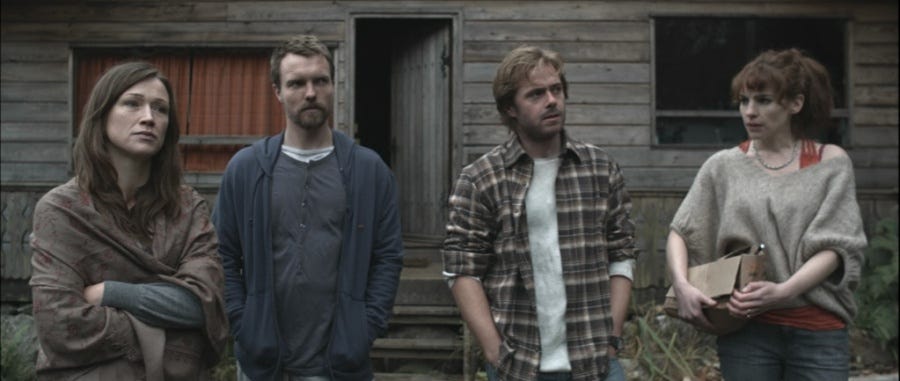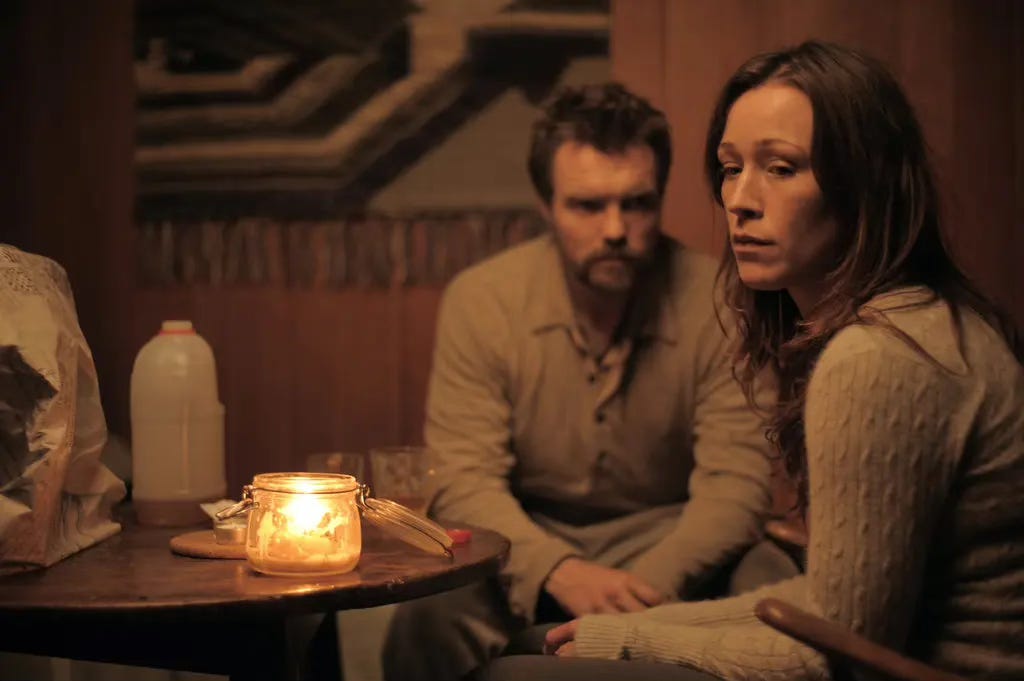On Screenwriting
Inspired by this week's exhibition of Film Ireland cover art in Flux Studios, I'm posting an article on screenwriting I wrote for the magazine.
Kelly Campbell in One Hundred Mornings
Conor Horgan on how he learned to jump into the middle of the script when writing One Hundred Mornings
I'd wanted to write a drama about an impending breakdown of society for quite a while – well, actually, ever since I'd started reading about the impending breakdown of society. My first attempt was called 'Greenland', and concerned a London adman who discovers something untoward while working on a major oil company account, which propels him out the doors of the agency and over to the other side. Unfortunately, the script soon descended into sub-Bourne shenanigans, with stony-faced men in black SUVs and helicopters pursuing our hero as he attempts to tell the world what lies ahead. It wasn't great, to be perfectly frank.
One unfunded submission to the Film Board later, I landed in the Catalyst project, a scheme which enabled three teams of filmmakers to shoot their first feature on an absolutely tiny budget. It was an inspiring process, and the moment I remember most clearly during the workshops was a production manager calmly telling us that if we went over budget, we couldn't have this, that, or indeed the other. As I listened to the growing list of what the films would have to do without, something occurred to me – this is how I can define the world of a film, by its absences. Authenticity could come from taking things out rather than by adding them. My micro-budget film about two mis-matched couples hiding out in a holiday home, trying to avoid the worst of a societal breakdown, was a go.
Deadline
I had an idea I was excited by, I had a producer who wanted to read what I came up with, and I had probably the most useful thing any writer can have – a deadline. So much of writing seems to be about surfing the deadline – start too early and there's a lack of urgency about the proceedings, start too late and panic takes over, leaving you forever teetering on the back foot.
Alex Reid, Ciaran McMenamin, Rory Keenan and Kelly Campbell in One Hundred Mornings.
Setbacks
It took four and a half months to write the first draft. There were a few initial setbacks, such as realising after writing the first 27 pages that page 28, which was after the second of the two couples arrived in the house, was actually page 1. I hit a few more speed bumps along the way, and a writer friend gave me some great advice by suggesting that I didn't necessarily have to write the script in order. I immediately jumped into the middle of the script and wrote one of the key scenes that the entire film revolved around, then darted to the finish to write what would turn out to be the first of several versions of the end before hopping backwards to start filling in the gaps. This gave me an episodic story that I could re-order as needed, and in the pell-mell rush towards the finish line I didn't have enough time to worry if I was making it too personal – I just put it all in.
I wrote in the mornings, mainly, until I couldn't write any more. After a while the real world changed from being a distraction to something else – it took on a ghostly sheen as I became smitten with the far more interesting, more exciting world of the film. It's a most pleasing state to be in, and if I could choose one super power it would be to be able to enter that other world at will.
The last elements I put in were a couple of jokes – well, not so much jokes as a few moments of paper-dry wit, which both suited the characters and made the tragic elements feel even sadder.
Who can you trust when the world is falling apart? Ciaran McMenamin and Alex Reid in One Hundred Mornings.
Moment of truth
As the cast and crew assembled for the first table read in the week before the shoot, I knew the moment of truth was approaching. Would the dialogue sound authentic? Would there be enough exposition? Would the damn thing work, or was I looking at feverish rewrites as we headed into the shoot? As that pivotal scene came closer, I shifted uneasily in my chair. Then, when Alex Reid said the first few lines, clearly and simply, I felt something. Even though everyone there was familiar with the script, they were all leaning forward, eager to see what would happen next. It was a great moment, and I knew the writer part of me had done his job, and now I could hand my baby over to the director (also me), hoping that he wouldn't mess it up. I was finished. Job done.
Of course, you're never really finished. There were many late night discussions during the shoot between myself and Katie Holly, the film's producer. We huddled over a kitchen table in our B&B, figuring out which scenes needed to be combined with other ones, and which could be binned completely. Every time I rehearsed a scene, I kept an ear out for lines of extraneous dialogue, and often dropped them completely. Even more came out during the edit, and I think I didn’t really finished writing the film until we hit picture lock. Even after that there were more lines of ADR [Additional Dialogue Recording] to write.
One Hundred Mornings isn't the first feature script I've written, but it is the first one that really felt like a film when I was writing it. It's a good feeling, and one I look forward to having again.
Postscripts:
The screenplay for One Hundred Mornings won Best Feature Script at the 2011 Irish Writer’s Guild Awards.
The film received a New York Times Critic’s Pick review
The film’s Director of Photography, Suzie Lavelle, went on to win the IFTA for best cinematography and is currently in the news for doing amazing work shooting episodes of Severance and the most recent Bridget Jones film. Whenever I’m asked what it’s like working with Suzie, I say she’s the best kind of collaborator you could hope to have on set - she’s the perfect combination of a fine artist and a Regimental Sergeant Major.
The exhibition of Film Ireland cover art continues in Flux Studios, Dublin.
One Hundred Mornings can be streamed on Prime Video.
The trailer for One Hundred Mornings





